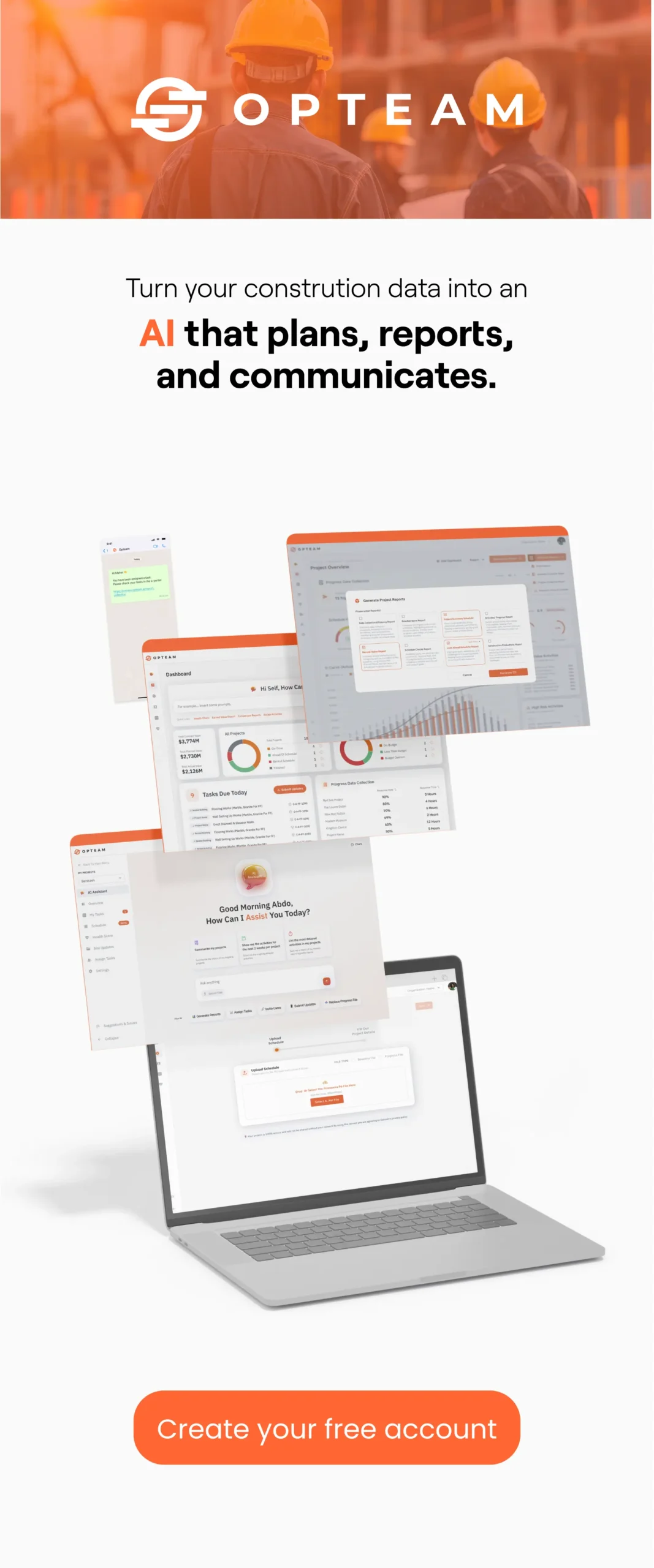In the construction industry, inefficiencies can be drainful, and many projects suffer cost overruns or get delayed, with only 8.5% of projects completed on time and on budget (source).
Cost tracking acts as a vital tool for companies’ profitability. Furthermore, the accuracy and diligence in construction cost management are essential.
Accurate cost tracking is the backbone of maximizing profitability, optimizing resources, and leading your project to victorious completion.
Construction Cost Management: Why Is It Important?
In construction, cost tracking allows managers to monitor expenses in real-time. By meticulously tracking costs associated with materials, labor, and equipment, construction companies can identify discrepancies between projected and actual expenditures.
This real-time insight enables quick adjustments to be made, preventing small issues from escalating into major financial overruns. Effective cost tracking ensures that funds are directed towards the most critical aspects of the project, thus enhancing overall profitability.
Additionally, with detailed cost data, construction managers can develop more precise budget for future projects, reducing the likelihood of unexpected expenses and delays. This proactive approach to financial management helps in negotiating better deals with suppliers and subcontractors, securing more favorable terms and prices.
Challenges in Construction Cost Management
Several challenges can cause inefficiencies in managing the cost of construction. They can be of two types: Challenges in accurately and practically estimate the budget of the work, before construction starts; and challenges in controlling the actual expenditures to avoid exceeding the budget, after construction starts.
Below are some of the detailed challenges.
Before Construction
1- Budget Overruns: Projects often exceed their initial budgets due to unforeseen costs, leading to financial strain.
2- Inaccurate Estimates: Not only the activities’ direct costs need to be accurately estimated based on practical productivity factors, but all indirect costs as well.
3- Omissions & Errors: The increasing complexity of modern projects makes errors and omissions very common in the preparation of estimates.
4- Insufficient time: The competitive bidding process can leave limited time for the preparation of detailed estimates.
During Construction
1- Unexpected Site Conditions: Unanticipated conditions on-site can lead to additional costs for mitigation and adjustments.
2- Changes: Modifications to project scope can lead to significant cost increases and require budget adjustments.
3- Complex Supply Chains: Managing and coordinating multiple suppliers and subcontractors can result in cost variability.
4- Labor Cost Fluctuations: Variations in labor rates and availability can impact overall project costs.
5- Material Price Volatility: Fluctuating prices of construction materials can affect actual project costs.
6- Inefficient Cost Tracking Systems: Lack of real-time cost tracking tools can hinder timely decision-making and cost control.
20 Tips For Efficient Construction Cost Management
Here are several tips to enhance cost management in construction, both before and during construction, as shown in the details below:
- Before construction, it is important to start with a detailed and realistic budget that includes all potential costs, such as materials, labor, equipment, permits, and contingencies.
- During construction, on the other hand, is to track actual expenditures using state of the art technology that helps to recover problems and avoid unnecessary overspending.
Before Construction
- Proper Contract Type and Size: Select projects wisely within the core expertise of your company.
- Estimate Costs Accurately: Check the quantities in the BofQ; Visit the site to get correct information; Review contract data carefully; Send enquiries to major subcontractors and materials suppliers; Determine the method of construction and the outline program of the works; Examine more economical alternative designs; and Avoid omissions of key indirect cost items.
- Risk Assessment: Add contingency for unforeseen conditions plus a proper markup.
- Supply Chain: Make sure to identify the items that require long or specialized supply chain.
- Cashflow: Estimate the cost of financing and establish credits with suppliers and providers.
During Construction
- Use of Technology: Utilize advanced software. e.g., Opteam to track expenses, and control cost.
- Accurate & Timely Monitoring: Identify variances early and take corrective actions promptly.
- Effective Communication: Maintain communication with stakeholders about cost saving roles.
- Change Orders: Monitor all changes and price them appropriately.
- Timely Invoicing: Submit accurate and timely invoices to avoid payment delays.
- Organized Site: Maximize safety and productivity through an organized site with all temporary facilities positioned appropriately.
- Material Management: Proper material storage and handling increases work productivity.
- Supply Chain: Proper tracking of long manufactured items and their delivery.
- Submittals: Establishing timely submittal evaluation speeds the approvals and avoids delays.
- Resource Management: Changing the work schedule to use limited available resources.
- Record Keeping: Collecting progress data in a timely and accurate manner is necessary.
- EV Analysis: Monitoring schedule and cost KPIs keeps the project on track.
- Delay Analysis: Analyzing progress records and determining responsibility for delays.
- Recovery Planning: Having tools to bring the project within constraints is necessary.
- Document Lessons Learned: Learning from existing projects improves future decisions.
Mastering Management with Opteam
From detailed scheduling to automated real-time updates, Opteam empowers you to stay on track and meet deadlines with ease. It’s a new software solution that integrates advanced planning capabilities with user-friendly progress tracking, making cost and time management simpler and more effective.
Opteam isn’t just about scheduling and budgeting; it’s about fostering collaboration and communication across your entire project team.
The platform ensures that everyone, from project managers to on-site workers, has access to the latest updates and information.
With mobile-friendly features, team members can update progress and communicate changes in real-time, no matter where they are. This connectivity ensures that everyone is on the same page, reducing delays and preventing miscommunication.
Conclusion
In the complex world of construction, cost management stands out for ensuring projects are efficient. This crucial practice is the foundation for guiding projects to profitability.
As the construction sector grows, refining cost management becomes key to staying competitive. The adoption of cost management tools can streamline construction workflows, making it easier to manage cost volatility.
The journey of enhancing productivity with construction cost management is ongoing. Your commitment to enhancing team communication and cooperation is vital. It’s through adapting and applying innovative solutions that your projects will achieve their goals.
This adaptation is crucial for not just survival but for flourishing in tomorrow’s competitive construction field.


